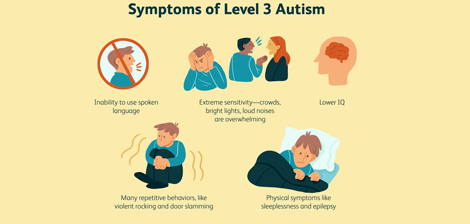
Autism, or autism spectrum disorder (ASD), is a developmental disorder that affects communication, social interaction, and behavior. It is typically diagnosed in early childhood and is characterized by a range of symptoms that vary in severity from person to person. The exact causes of autism are not fully understood, but researchers believe that a combination of genetic and environmental factors may play a role.
Some common symptoms of autism include difficulty with social interactions, such as making eye contact, recognizing social cues, and understanding others' emotions. People with autism may also have repetitive behaviors or routines, such as repeating phrases or doing the same activity over and over again. They may have difficulty with sensory processing, which can lead to sensitivity to certain sounds, textures, or lights.
The severity and type of symptoms can vary widely among people with autism, and this is why it is referred to as a spectrum disorder. Some people with autism may have severe language and communication delays, while others may have average or above-average intelligence and excel in certain areas. Some people may have sensory issues that affect their daily lives, while others may have no sensory issues at all.
Diagnosis of autism typically involves a comprehensive evaluation by a team of healthcare professionals, including a developmental pediatrician, psychologist, speech therapist, and occupational therapist. The evaluation may include a review of the person's medical and developmental history, observation of the person's behavior, and standardized tests and assessments.
While there is no cure for autism, early intervention and treatment can help improve the lives of people with autism and their families. Treatment may include behavioral therapy, such as applied behavior analysis (ABA), which uses positive reinforcement to teach new skills and behaviors. Speech therapy can help improve communication skills, while occupational therapy can help with sensory processing and fine motor skills.
Medications may also be used to manage specific symptoms, such as anxiety or hyperactivity. However, medication should always be used in conjunction with other treatments and should be closely monitored by a healthcare professional.
In recent years, there has been increased awareness and understanding of autism, as well as efforts to improve access to services and support for people with autism and their families. There is also ongoing research to better understand the causes of autism and to develop new treatments and interventions.
It is important to remember that each person with autism is unique and should be treated as an individual. By recognizing and understanding the strengths and challenges of people with autism, we can create a more inclusive and supportive society for everyone.


Get Free Appointment
We are more than happy to give advice on which counselling is most suitable for your needs, depending on your problems. Why not ask us to view your problems and discuss for solution.
